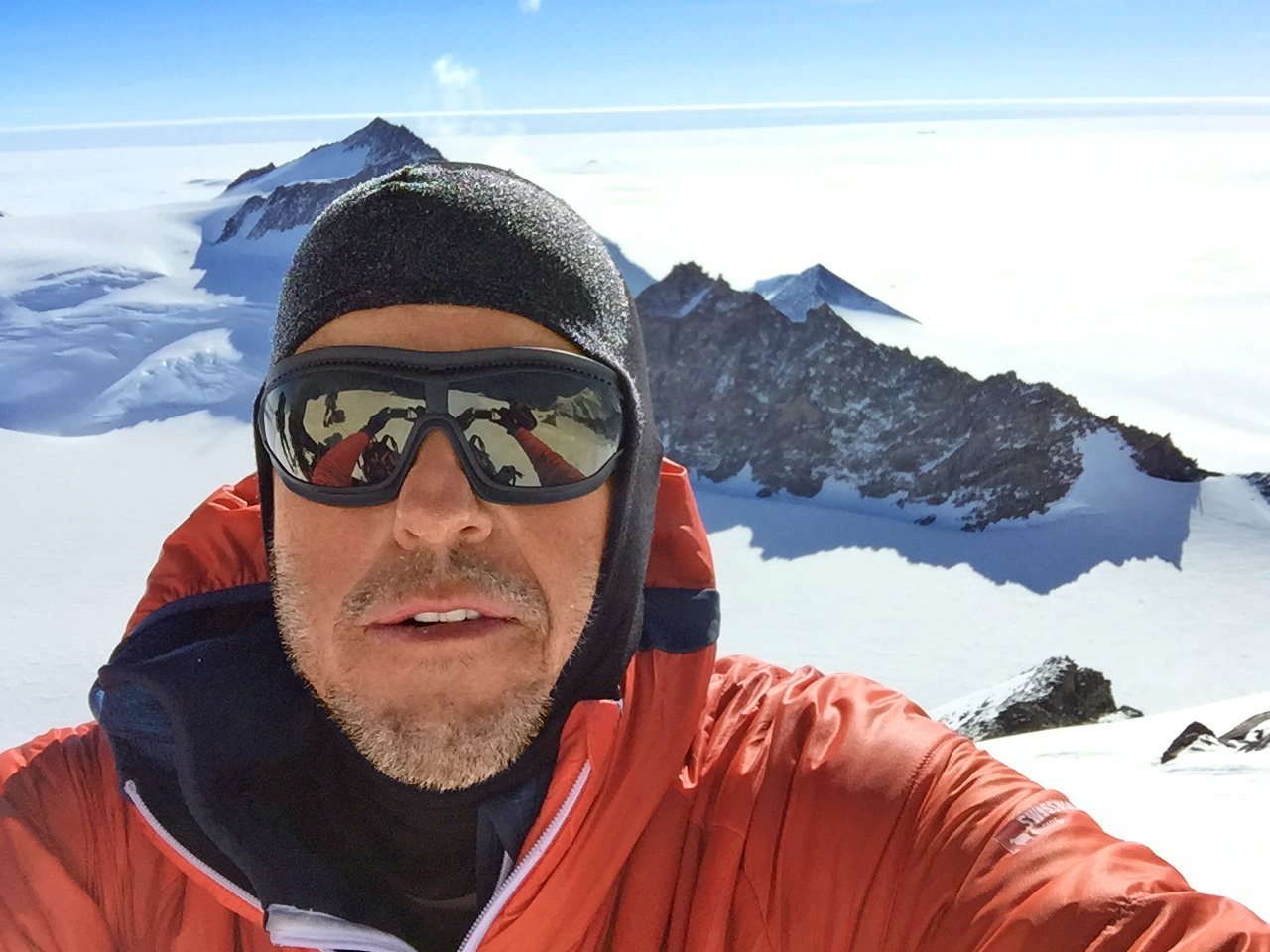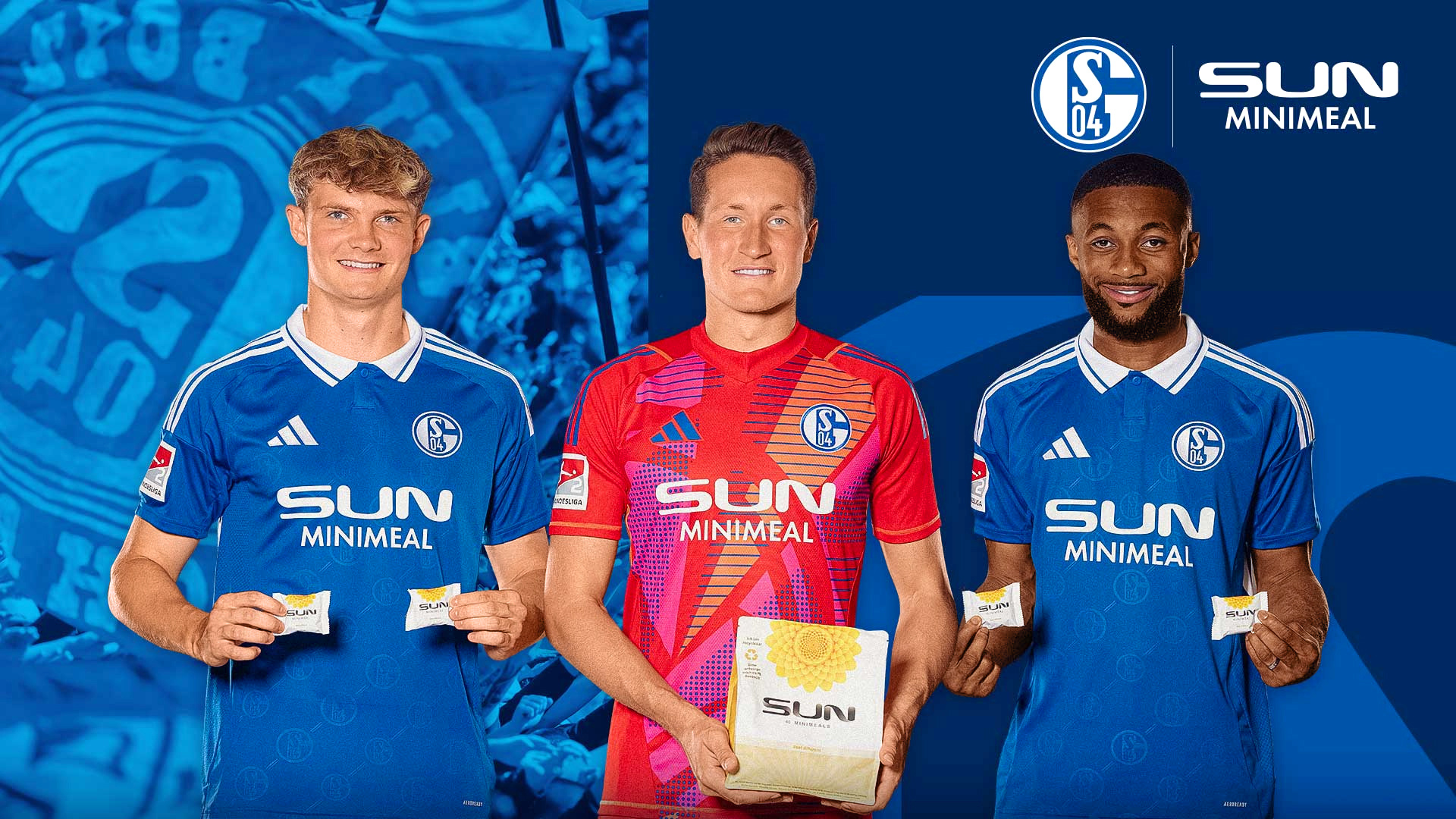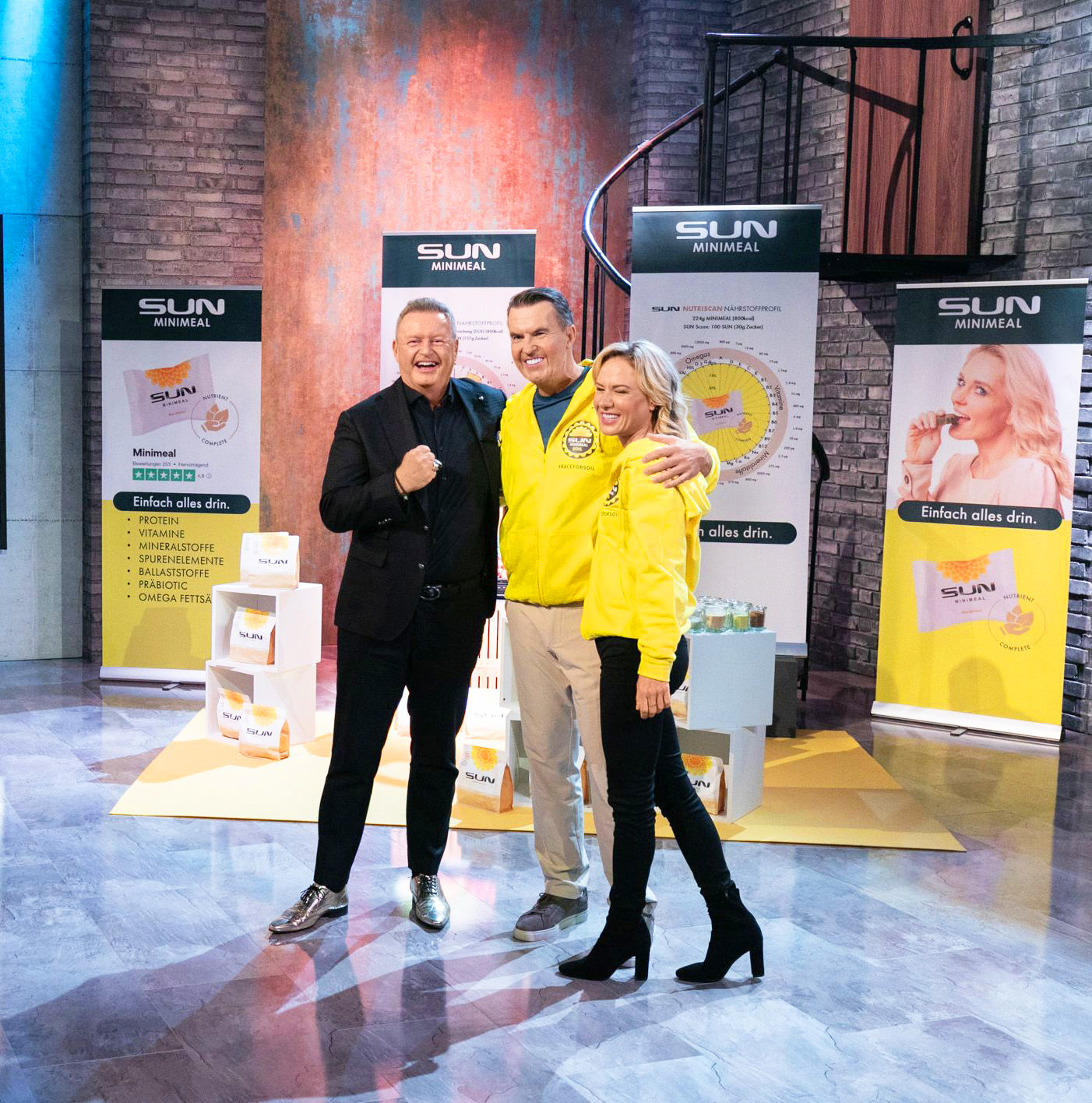
Visionary: With his Swiss-based company Sun AG, Austrian Wolfgang Grabher aims to revolutionize the European food market with his nutritional supplement Sun Minimeal
I originally come from the food industry. After completing my training as a chef, I moved to the US and began exploring technology. The question I asked myself was whether it might be possible to produce a food that contains all the nutrients it needs. But there was also another impetus for the idea for Sun Minimeal.
Yes?
At the time, I was looking for a food source that would allow me to climb the highest mountain in Antarctica, one of the Seven Summits, the almost 5,000-meter-high Mount Vinson. Originally, I wanted to conquer Mount Everest. But that wasn't possible because of an accident there the year before, and no further expedition licenses were issued for a while. So I decided on an alternative—and that was Antarctica.
What was the biggest challenge of your Antarctic expedition?
The topic of nutrition . I definitely didn't want to embark on the expedition with conventional foods or synthetically produced nutritional supplements, so I waited until I had developed my own food that met my needs and naturally contained all the nutrients I needed. In December 2016, the time had finally come.

I assume that the weight of the luggage plays a significant role on such an extreme tour?
Exactly. And fruits and vegetables are relatively expensive. Expensive because they consist of 80 to 90 percent water. Every kilogram imported into Antarctica costs about $50. I couldn't understand why, in an age where you can build wireless telephones or send a rocket to the moon, it shouldn't also be possible to develop something innovative, something completely new, in the food sector. And that's how I came up with the idea of Sun Minimeals...
...the "healthiest food in the world," according to your own statement. However, according to science, watercress is the only food that can cover 100 percent of your daily needs with every 100 calories consumed.
The study you cite isn't quite true. It's also true that 100 calories aren't enough to cover your daily needs. Our goal, however, was to create a food that covers 100 percent of your body's needs. We analyzed watercress and compared it with Sun Minimeal using a Nutriscan. We found that more than 500 grams of watercress are needed for a 100-calorie serving. This amount provides 100 percent of the 38 essential nutrients, including vitamins A, C, K, and B9, and the minerals calcium, iron, and manganese. The data is based on the Federal Food Code (Bundesnahrungsmittelschlüssel). The cost of 100 calories of watercress, equivalent to 526 grams, is a horrendous €55, making it pointless.
“All nutrients contained in Minimeal are ripened under the sun
What exactly is Minimeal?
With this product, we're able to offer a complete diet that normally requires around 3,000 calories. However, we manage it with just 800 calories. That's the key innovation. And the second is that we do it all naturally. The name "Sun" also comes from the fact that all the nutrients contained in Minimeal are ripened in the sun and not from a laboratory.
Who is the target audience for Sun Minimeal?
Basically, anyone who wants to eat healthily and has little time to deal intensively with the topic of nutrition.
Is Sun Minimeal a snack?
The bar can also be used as a snack. If you take two bars, it's a meal replacement. You can also use Minimeal for weight loss or as a complete ketogenic diet.
The product is 100 percent vegan?
Yes, but we don't advertise it in bold. Why? Many people are resistant to the idea of a meat-free diet because they believe you can't eat healthily on a purely plant-based diet. Our products are therefore more than just a purely vegan diet. They are whole-food products that also happen to be purely plant-based. Our protein profile is composed of purely plant-based ingredients and therefore has a better amino acid score than meat . And we're really proud of that.
“With our products we reduce 90 percent of food resources
You have an innovative approach not only to your product but also to marketing. What's the deal with the so-called Soil tokens?
Soil Tokens are a pure bonus program with which we want to reward our customers. Reward them for sticking with it, for making a contribution to their own health, but also to the environment. With our products, we reduce 90 percent of food resources. And with the bonus points, we want to create an incentive. The whole thing is free.
And how does this work in detail?
You buy a product from us. We use 20 percent of the sales we generate online to buy these as Soil tokens, thus removing them from circulation. These tokens are stored on a blockchain. If the token becomes deflationary, this leads to increasing demand. The more is consumed, the more is burned. And that is the basic principle of our token model.
So we're talking about our own cryptocurrency here? Aren't many customers in this country rather skeptical about this digital currency?
Admittedly, this is a very controversial topic. Coins can rise in value, but they can also fall. When prices fall, customers often get nervous and sell at a loss. And when many do this, the price tends to fall toward zero and usually stays there.
And that's supposed to be good?
The advantage of our model is that when the price of our Soil token drops, everyone is happy because more of them are automatically bought and burned by the company. For example, if the price is 0.50, 2,000 Soil tokens can be purchased from Sun AG for €1,000 and removed from circulation. If the price is 1.00, 1,000 Soil tokens can be purchased. The more customers join, the more of the limited Soil tokens are purchased and removed from circulation. This is also called buy & burn.
These cryptocurrencies can go up and down very quickly. Don't customers have any fears of loss?
We give our customers this token with their purchase. This way, there's no sense of loss. The whole thing is essentially a new kind of payback system. And it's comparable to any other cryptocurrency, such as Bitcoin. If you look back over the last 13 years, the trend is clear: you can only win with cryptocurrencies in the long run, at least if you simply hold them. In 2011, one Bitcoin cost about four to five euros. Today, one Bitcoin is worth more than 100,000 dollars. And Bitcoin is used by approximately one billion people. If we had one billion users, the environmental issue of declining arable land would be solved.
Can I convert my token into analog money if I want?
Of course. You can exchange this token for any other cryptocurrency, such as Bitcoin or even digital dollars...
And withdraw money from the ATM?
Of course, this is also possible via indirect routes.
You made headlines in Germany last year. In July, it was announced that you were joining Schalke 04 as the new main sponsor. A traditional club that now plays in the second division. Why do you still consider the Royal Blues the ideal partner for your product?
Firstly, Schalke is a club everyone knows. Secondly, football sponsorship placed front and center works. So, the goal was to raise awareness of the brand. And, of course, Schalke 04's large fan base plays a major role in that. We're talking about almost nine million people. And Schalke fans are considered loyal. It doesn't really matter if they play in a different league for a short time. The sense of solidarity is simply tremendous, and that's why we decided to partner with them.

Schalke fans, however, are considered more traditionalists. Simple Ruhr Valley workers who eat currywurst and drink beer with it. How does that fit with an innovative, vegan nutritional supplement?
Mining will also come to an end at some point—nothing lasts forever. Today, we live in the electric age. At some point, a cultural shift will take place everywhere. And because we produce a highly sustainable food product and want to be a role model, especially for young people, we see it as a responsibility and an obligation to break new ground.
Your entry as a Schalke sponsor wasn't met with a positive response everywhere. The "Bild" newspaper, for example, ran the headline: "CEO has multiple criminal records and spent time in prison: The thick criminal record of Schalke's new sponsor." Did you expect such backlash?
Yes, because I always communicated this openly and transparently. It was also a condition of Schalke's that I transparently disclose my entire background before we entered into a partnership. This was then passed through the board. During the investigation, it emerged that I was in custody on false charges. I hadn't committed any offenses that would indicate a bad character. But those incidents happened a long time ago, some of them ten years ago. That means they no longer appear in any criminal records.
“Our deal was the biggest ever made on German-speaking television
Still, what does it do to you when you're confronted with such headlines? Have you taken legal action against them?
No, I'm not. A lot of things are simply copied, but that doesn't make them any more true.
If you look back, what would you do differently today?
I probably wouldn't take another company public in America.
As part of your Schalke commitment, you're working with extreme athlete Joey Kelly. What's that all about?
Joey Kelly is a true marathon runner who has achieved incredible things in life and touches people with his energy. He also stands for sustainability, making him a perfect fit for our brand.
What is the Joey Kelly Challenge?
This will be a 100-kilometer run starting at Schalke Stadium on April 26. People can apply for this "Race for Soil" and then run this long distance with us.
Can anyone register?
Yes. Of course, you should have a certain level of fitness . After all, 100 kilometers is no small feat. Participants should be able to jog for at least an hour and a half without a break .

You recently concluded a major investor deal on the show “2 Minutes 2 Million,” the Austrian equivalent of “The Lion’s Den.”
If I understood correctly, this is the largest deal ever made on German-speaking television. We sold 6.5 percent of our company's shares to the Christian Jäger Group for four million euros. What's also special about the deal is that the investment is in the form of Soils, a cryptocurrency.
You're a trained chef. How did you become what you are today?
I didn't want to spend my whole life confined to four walls, having to work when others were off, and cooking the same thing for the 47,000th time.
What did little Wolfgang want to be when he grew up? What was your big dream?
He always wanted to be a hotelier.
And why didn't he become that?
Who says this dream is over? My vision is still to build a sustainable hotel in Antarctica someday.
Back to Antarctica?
Yes, I'm fascinated by this vastness. Antarctica would be a perfect retreat.
Would you describe yourself as an ambitious person?
That word embodies both honor and greed, neither of which I am. But I'm definitely ambitious. I compete to win. Sometimes, though, it's better to be first in the second row than second in the front row.








